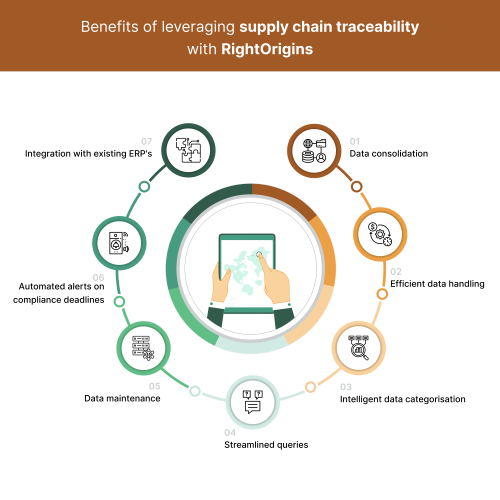Understanding the relevance of Supply Chain Visibility
In today’s interconnected world, supply chains resemble intricate puzzles, with each piece representing a node in a vast global network. Yet, amidst promises of efficiency and innovation, data fragmentation persists as a challenge. Fragmentation, characterised by disjointed data landscapes and communication breakdowns, obstructs seamless operations. It has significant implications, hindering decision-making and eroding stakeholder trust. The COVID-19 pandemic underscored the vulnerabilities of fragmented supply chains, exposing companies to unforeseen disruptions due to lack of visibility.
How to manage fragmented data across supply chains?
In the intricate maze of fragmented supply chains, effective management is crucial for smooth operations and risk mitigation. The linchpin of this challenge is the adoption of comprehensive supply chain traceability. By leveraging traceability solutions, companies can methodically collect the necessary data to track their supply chains, thereby promoting transparency and accountability at every stage.
One of the primary benefits of supply chain traceability is its role in compliance. In today’s business landscape, compliance with regulatory requirements is non-negotiable. Traceability enhances visibility and satisfies regulatory mandates, enabling companies to analyse risks and ensure adherence to industry standards. By leveraging traceability, organisations gain valuable insights into their supply chains, positioning themselves for competitive advantage in an increasingly complex and interconnected market.
Pioneering role of traceability in navigating compliance challenges:
Effectively managing fragmented supply chains requires a proactive approach that addresses the inherent complexities and risks. Through a comprehensive supply chain audit, companies can identify areas of fragmentation and implement best practices to minimise its negative impact. The overarching goals of such efforts revolve around increased integration and improved coordination across the supply network. One critical aspect of managing fragmentation involves navigating compliance challenges on a global scale. Traditional approaches must catch up with constantly shifting regulations, highlighting the need for dynamic strategies.
Benefits of leveraging Supply Chain Traceability for Compliance
In this dynamic landscape, businesses use innovative supply chain technology solutions to enhance operational efficiency and ensure real-time compliance. By embracing adaptive solutions tailored to the intricacies of the global supply chain, companies can effectively manage fragmentation and foster resilience in their operations. Listed below are a few benefits of leveraging supply chain traceability:
1. Streamlining Data Consolidation:
As the global market continues to grow, businesses are faced with an increasing volume of paperwork, ranging from certificates of origin to compliance documentation. This abundance of information from various spreadsheets, emails, and excels presents a significant challenge as it consumes precious time and resources, while also heightening the risk of errors and omissions. However, the adoption of traceability can bring about significant benefits. It consolidates data from all levels of the supply chain, offering a comprehensive overview of its operations, and thereby paving the way for improved efficiency and accuracy.
2. Improved Supply Chain Visibility
Instant access to critical information ensures transparency across the supply chain, granting stakeholders immediate insight into supplier details, sustainability standards, ESG risk factors, and compliance challenges. This enhanced transparency facilitates seamless process optimisation and strategic decision-making.
3. Supply Chain insights help in decision-making:
Businesses benefit from real-time visibility, gaining immediate insights into supply chain operations. This rapid access to data enables organisations to make prompt decisions, enabling timely responses to emerging challenges, ESG risks, or evolving regulatory demands.
4. Proactive Risk Mitigation:
Continuous monitoring using real-time visibility enables proactive risk mitigation. By swiftly identifying emerging issues, businesses can take prompt corrective actions, thereby preventing compliance breaches, minimising ESG risks and safeguarding the integrity of the supply chain.
5. Dynamic Adaptability to Regulatory Changes
Amidst the ever-changing landscape of global regulations, real-time visibility provides agile adaptability. The system can swiftly integrate updates in compliance requirements, ensuring continuous alignment with the latest regulations. This proactive approach mitigates the risk of penalties and disruptions, maintaining the supply chain’s compliance integrity.
6. Improved Collaboration Across Stakeholders:
Real-time visibility promotes enhanced collaboration among diverse stakeholders within the supply chain. Whether manufacturers, distributors, or logistics partners, all parties have access to essential data. This shared visibility facilitates improved communication, coordination, and efficiency, fostering a more synchronised and compliant supply chain ecosystem.
How can RightOrigins help in leveraging supply chain traceability for strategic advantage?

Our AI-powered RightOrigins platform centralises and streamlines compliance and product data, automating responses to queries and creating a comprehensive digital profile for easy sharing. Key features include:
- Data Consolidation: Helps to securely upload and manage all sustainability and compliance data within our platform.
- Efficient Data Handling: Our AI and compliance teams digitise, organise, and index data for improved searchability and insights.
- Intelligent Data Categorisation: Data is categorised, indexed, and tagged for regulated access.
- Streamlined Queries: Uploads data requests and receives shareable response links for enhanced communication.
- Data Maintenance: Monitors and updates data for relevance and uniformity.
- Automated Alerts: Receives real-time alerts for anomalies and compliance deadlines.
- Integration: Easily integrates with existing systems for efficient data synchronisation.
Conclusion:
In summary, leveraging supply chain traceability for compliance yields numerous benefits in today’s business environment. Through comprehensive mapping, organisations can actively monitor and address evolving risks associated with individual suppliers and the entire supply chain network. Furthermore, as regulations continue to evolve, there is a growing imperative for businesses to demonstrate responsible consumption and sourcing practices. Hence, compliance is no longer viewed as optional but rather as imperative.
